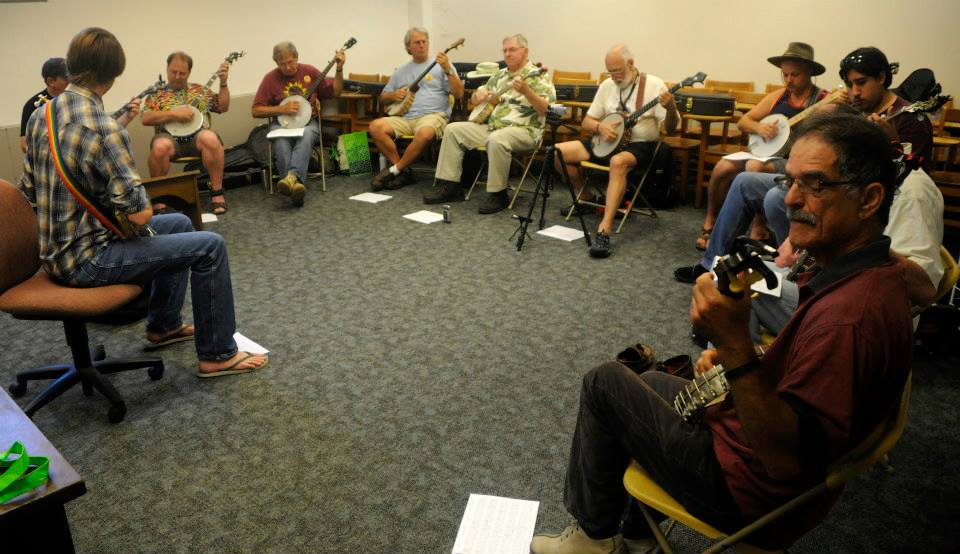Photo (right): Sam and Saro Lynch-Thomason teaching at It's Good To Be Young in the Mountains, Harlan, Kentucky.
Photo by Lou Murrey.


Appalachian Song (suitable for singers of all experience levels)
Lift your voice and learn to sing old-time songs from the mountains, including ballads, hymns and light-hearted songs. Experience a variety of traditional Appalachian singing styles, practice singing without accompaniment, and learn how accompaniment shapes a song. Singing will be taught "by ear," in a method suitable for beginners and experienced singers. By singing and learning the stories behind the sources of the songs, students will be exposed to the diverse cultures of Appalachia.
Harmony Singing (suitable for singers of all experience levels)
Hone your harmony singing skills and study the varied duet singing styles from the American South. Add old time country standards, sacred songs and traditional ballads to your repertoire while building rich harmonies. Singers in this class will learn to create unique harmony lines, match phrasing with singing partners, and apply ornamentation used in Southern singing styles. A basic music theory overview of harmony singing will be provided but harmony singing will be taught “by ear” in a method suitable for singers of all experience levels.
String Band (easily adapted for students of all experience levels and various instruments)
Learn to play Appalachian music as an ensemble. As the class band coalesces, we work together to focus on a few traditional dance tunes and participatory songs and arrange them for the group. This workshop includes advice on performing and musical collaboration, instruction on various instruments, practice of harmony singing and fun throughout!
Clawhammer Banjo (beginning, intermediate or advanced levels)
Learn the frailing stroke, explore drop-thumb styles, and experiment with different banjo tunings. Participants will learn how to accompany traditional dance tunes and songs and pick out melodies and solos. The history of the banjo will be incorporated throughout the workshop, from its African origins to its established identity as the instrument of Appalachia.
Songwriting: Singing Our Stories (suitable for songwriters of all experience levels)
Kentucky songwriter Harlan Howard said folk music is “three chords and the truth.” Transform stories from your lived experience, your worldview and your truth into songs. Students will closely review style and form in traditional and contemporary songs, then generate their own songs. Collaborative writing, songwriting as a daily practice, navigating the publishing process and applications for finished songs will be discussed.
Guitar (beginning, intermediate or advanced levels)
Take part in step-by-step explorations of American folk and country guitar styles. This workshop can focus on accompaniment for traditional dance tunes, Mother Maybelle Carter’s famous “scratch,” alternating bass fingerpicking, basic melodic flatpicking or a combination of these styles. Discussions include use of drop-D tuning, crafting accompaniments for your voice, basic music theory and technique, and capo wisdom.
Fiddle (beginning or intermediate levels)
Appalachian fiddle tunes are incredibly diverse, running the gamut of reels, hoedowns, waltzes, polkas, slow airs, rags and lyric songs. This workshop focuses in depth on a small number of fiddle tunes, paying particular attention to bowing styles, alternate tunings and playing the tunes in an ensemble. Playing for dancing and accompanying the voice with the fiddle will be discussed.
Appalachian Dulcimer (beginning, intermediate or advanced levels)
The versatile Appalachian dulcimer (also called a lap dulcimer) can be used to accompany the voice, play melodic solos and accompany dancing. Learn strumming and fingerpicking styles, chords and craft accompaniments for songs using countermelodies. History of the dulcimer will be told through stories of noted Appalachian players such as Jean Ritchie, I.D. Stamper and Betty Smith. Participants will tune the dulcimer to play in various keys and modes.
Autoharp (beginning or intermediate levels)
As one of the most approachable instruments in folk music, the autoharp can do much more than accompany sweet and sentimental songs. Participants will explore basic strumming, accompaniment for dance tunes, rhythmic variations for strumming and the melodic lead style pioneered by Southwest Virginia musicians Maybelle Carter, Ernest “Pop” Stoneman and Kilby Snow.
The following concepts can be adapted for various educational levels and settings. Program length can be adjusted for a single session or multiple day residency.
